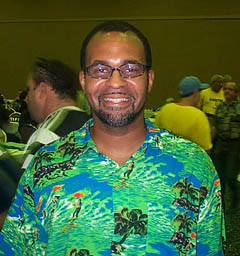 |
 |
 |
 |
 |
 |
 |
 |
 |
 |
 |
 |
 |
|
|
|
|
|
|
|
|
|
|
|
|
|
|
 |
|
|
|
|
|
|
|
|
Howard University Chess Club on the march!
|
|
|
|
|
|
|
|
|
|
|
|
|
|
Kerri Cox, "Howard Chess Club Reaches Out to D.C. Community," The Hilltop - Campus, 15 November 2005.
|
|
|
|
|
|
|
|
|
|
|
|
|
Members of the Howard University Chess Club expanded their knowledge of chess with area children by hosting a casual tournament session for children of the Olympic Chess House.
Held in the West Ballroom of the Blackburn Center last Wednesday, the tournament offered students a rare opportunity to see children ranging from six to 14 become the intellectual equals of college students as they faced off over the chess board.
|
|
|
|
|
|
|
|

|
|
|
|
|
|
|
|
|
"We see this as another opportunity to reach out to the community. Each semester, the children from the Olympic Chess House come and play members from the Howard Chess Club," said Keron George junior engineering major and president of the Howard University Chess Club. "It allows them to see the campus and also inspires them to continue the game especially when they can brag that they've played university students and won."
The Olympic Chess House is an organization that is committed to teaching the game of chess to children in the D.C. community. Established in 2000, the club holds training sessions at various district schools and also allows for children within the program to participate in tournaments throughout the year. Since its conception, more than 3000 children ranging from ages four to 17 have taken part in some aspect of the program.
|
|
|
|
|
|
|
|
|
 |
|
|
|
|
"It's a positive game. Of course they play other sports as well, but with chess they're using their brains… and I always say that the brain works the body...the body doesn't work the brain."
~ Alicia Rucker, Chess Mom ~
|
|
|
|
|
 |
|
|
|
|
|
|
|
|
|
Founder and coordinator of the Olympic Chess House, Vaughn Bennett, sees chess as a powerful educational tool that can greatly impact and shape the future of children.
"For too long we have been denied access to games such as golf and tennis," Bennett said. "But we will break through. Many universities offer chess scholarships to worthy students. Thus, I see chess as a game that can pave the way for their future."
Alicia Rucker looked on as three of her children played against college students more than twice their age in the tournament. She agreed that she wants to see her children successfully positioned in college and thinks that the scholarships offered would help significantly. However, she said that this was not the sole reason for their involvement in the game.
|
|
|
|
|
|
|
|
|
|
|
|
|
"It's a positive game. Of course they play other sports as well, but with chess they're using their brains," Rucker said. "And I always say that the brain works the body...the body doesn't work the brain."
As well as being founder and coordinator of the Olympic Chess House, Bennett also acts as mentor and coach to the members of the Howard Chess Club. He has invested time in the club since 2001 and has also made arrangements for members to participate in tournaments such as the National Chess Congress and the Pan American Intercollegiate Chess Championships. In 2003, the HU Chess Club participated in the National Chess Congress and won in every section in which it entered. In the Pan-American Championships, the team representing the club placed 19 out of 36 teams.
|
|
|
|
|
|
|
|

|
|
|
|
|
|
|
|
|
|
Vaughn Bennett, Executive Director
Olympic Chess House
|
|
|
|
|
|
|
|
|
|
|
|
|
|
|
This year, the club is again hoping to represent Howard in a number of tournaments and is currently training a team of seven to eight people to participate in its first tournament during the Thanksgiving break. Until then, however, its mission is to raise awareness of the club on campus and to give back to the community whenever it can.
"We realize that, as a club, we've gotten a lot of help from older players who have always come to meetings to offer support and to help those less experienced players develop their game techniques. So we want to do the same for the young players out there," said George, president of the Howard University Chess Club.
The enthusiasm shown by the young players present at the tournament proves they have already developed a passion for the game of chess. When asked to describe his feelings for the game, 9-year-old Akili looked briefly away from his fifth game of the night and said simply, "I like it… I think it's challenging."
|
|
|
|
|
|
|
|
|
|
|
|
|
|
|
 |
|
|
|
|
 |

